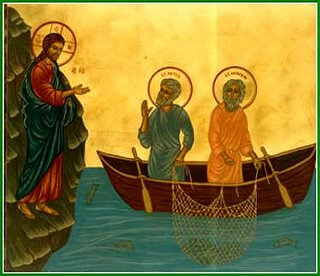As he was walking by the lake of Galilee he saw two brothers, Simon, who was called Peter, and his brother Andrew; they were making a cast into the lake with their net, for they were fishermen. And he said to them, ‘Come after me and I will make you fishers of people.’ And at once they left their nets and followed him.
Commentary:
In this passage we have the narrative of the calling of the first disciples. Here we have a Jesus who not only came to teach, work some miracles, get crucified and then rise. He did more than that. His works are uninteligible apart from the economy of the calling, upholding and sending of the apostolate. The economy of the Son is an economy wherein he came and made disciples, he made followers. Reading this narrative we can ask then, “what makes Peter and Andrew disciples?” Was it something Jesus saw in them, some potential he could see beneath the surface? Certainly not; after all they were just simple fishermen. What Matthew is underlining for us is the power and potency of Jesus’ Word, not Peter or Andrew’s potential. Jesus says, ‘Follow me’ and immediately they drop (aphentes) their nets and follow. Earlier we meet this in the Greek in Jesus’ encounter with the Baptist and with Satan. When Jesus says to John ‘let us’, John ‘let’ and when Jesus said ‘leave’ Satan ‘leaves’ (aphentes). Luther’s words are apropos: “When this Speaker saith something that He will have, it must be so”.
In the Rabbinic tradition, ‘follow me’ meant “come, be my students, be apprenticed, join my school.” Ordinarily, students would seek out rabbis or teachers. But this rabbi is also Lord. He seeks out his followers. No one comes to this one by one’s own initiative. This one, whose identity is the self-same Johannine “Lamb of God”, the “Messiah”, calls and so comes to them first: “you have not chosen me, but I have chosen you” (Jn. 15:16). Barth notes that this passage, “this first calling” stands in direct connection with the beginning of Jesus’ proclamation of the fulfilled time and the immanent kingdom of God. So Barth:
Throughout the Gospel narrative which follows, this prophetic action will always be His, and will consist in words personally spoken and deeds personally performed by Him...when Jesus Himself makes his debut as Prophet, His call to discipleship implies commissioning to their own future speech and action. Hardly has His own Word gone forth concerning the fulfilled time, the kingdom, conversion and faith, before they must attach themselves to Him and in some sense tread on His heels.Barth’s words draw us to consider the differentiating and electing will of of the Word by whose power we cease to be what we were and become what we were not: followers of Jesus and in correspondence to his action by his action we too are made to be “people fishers”.

1 comment:
Great to see your new blog, Patrick!
Post a Comment